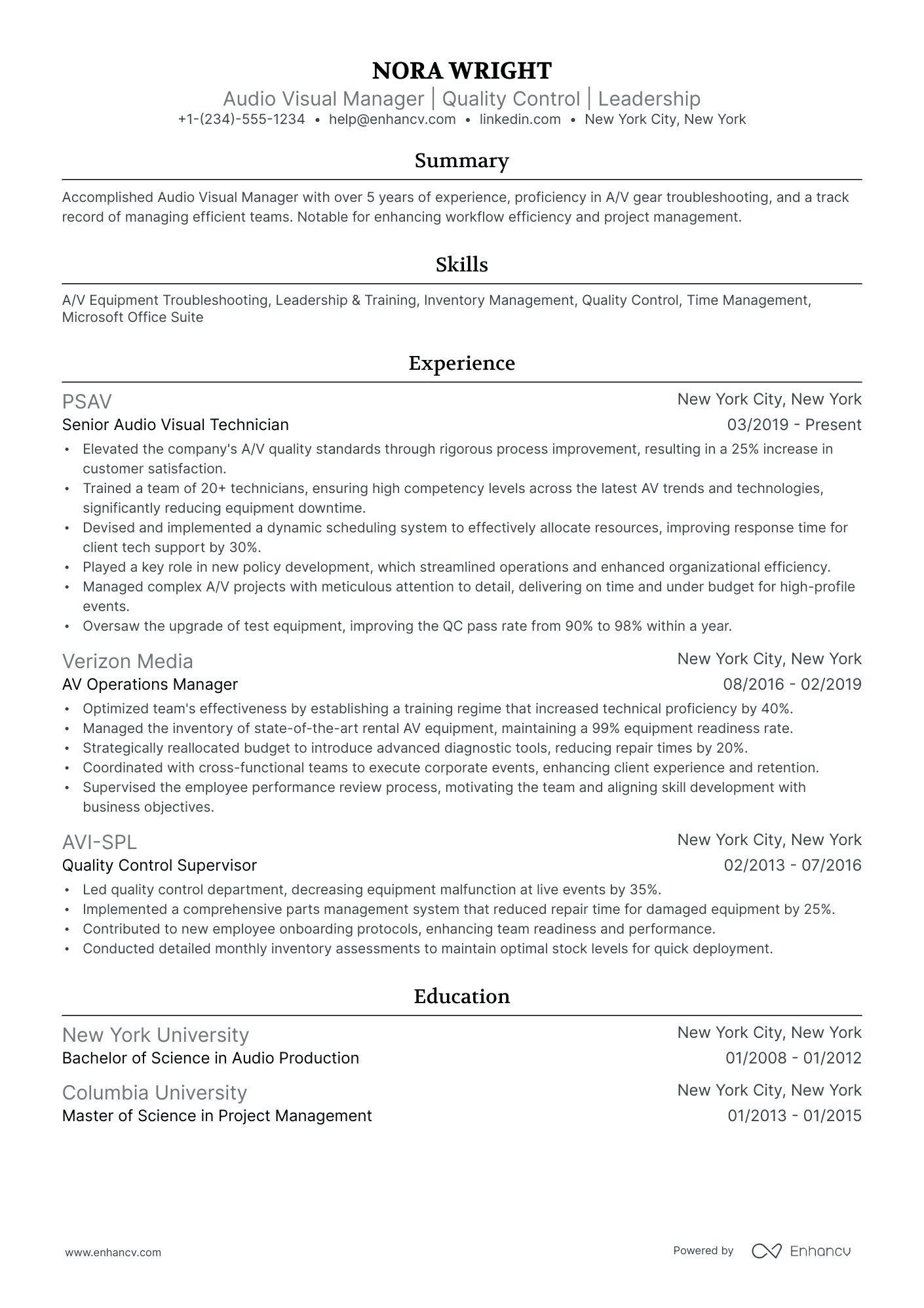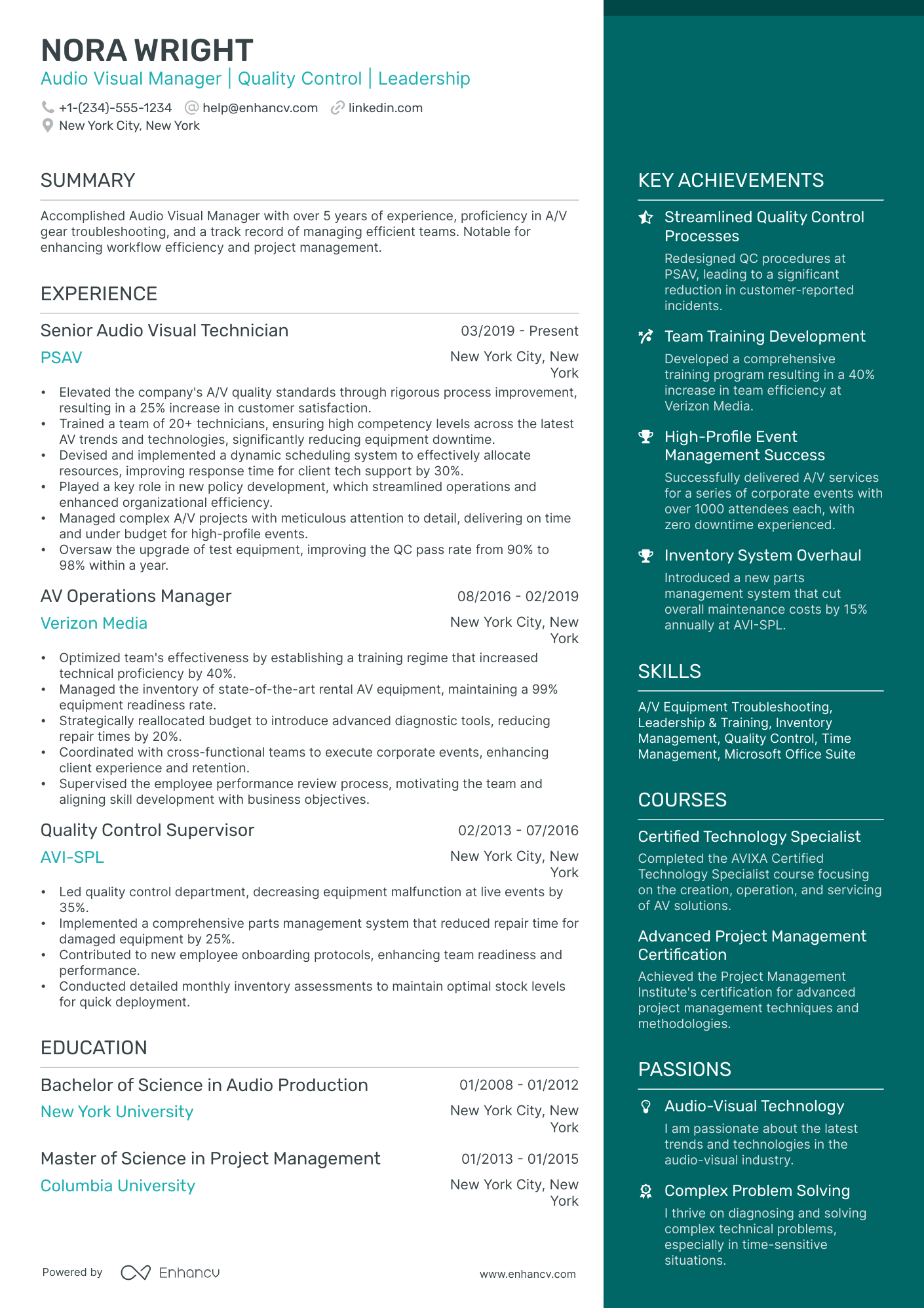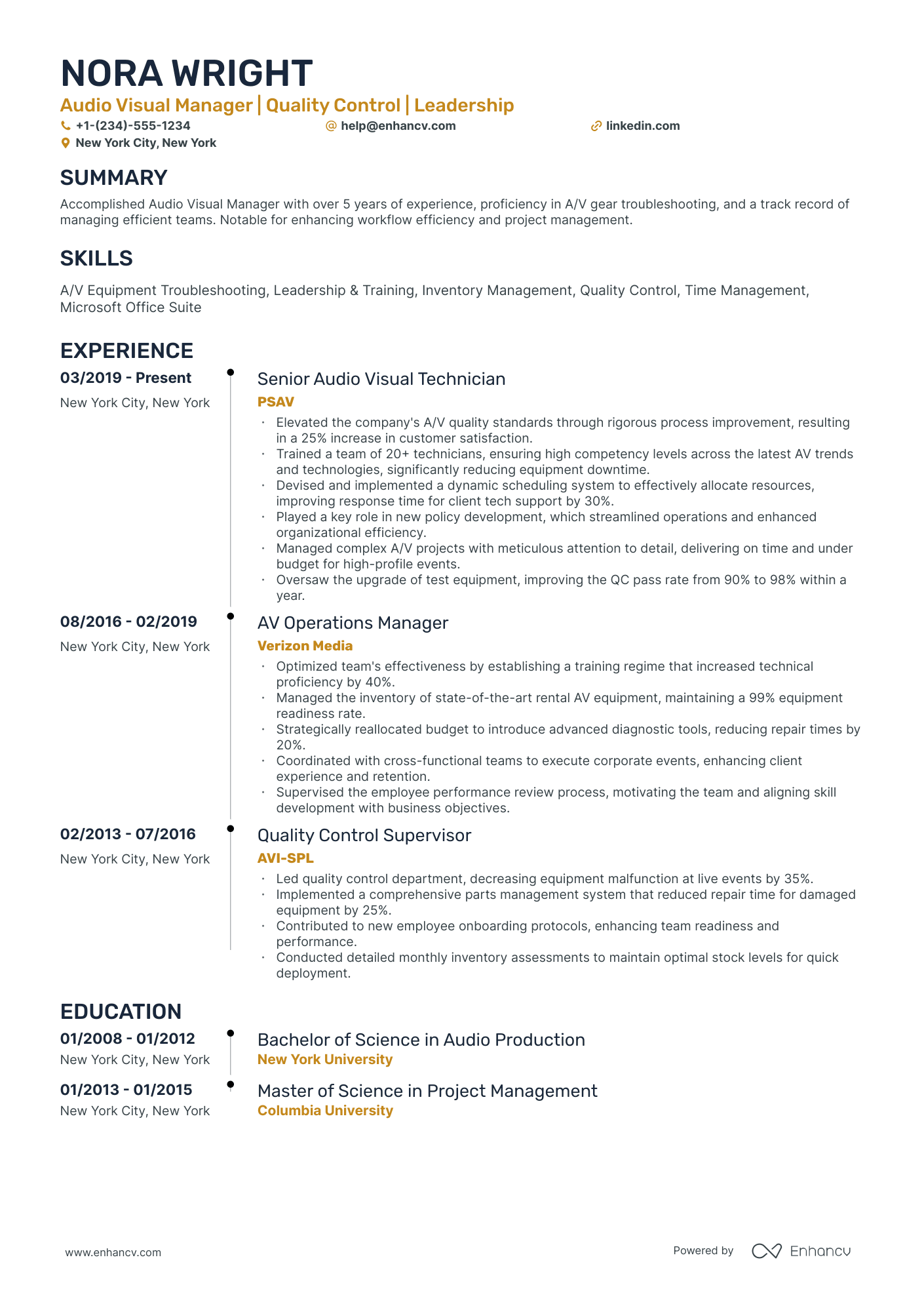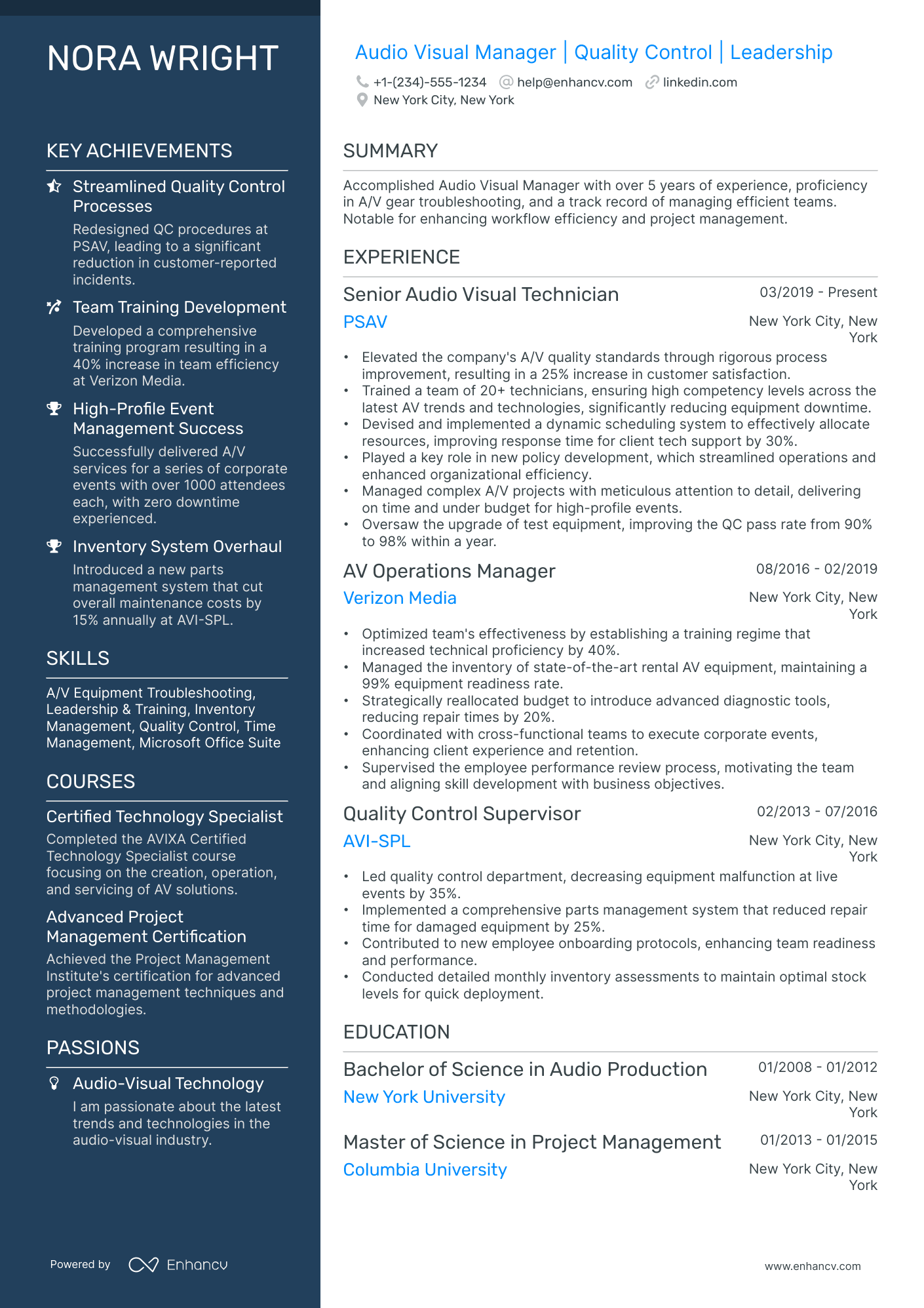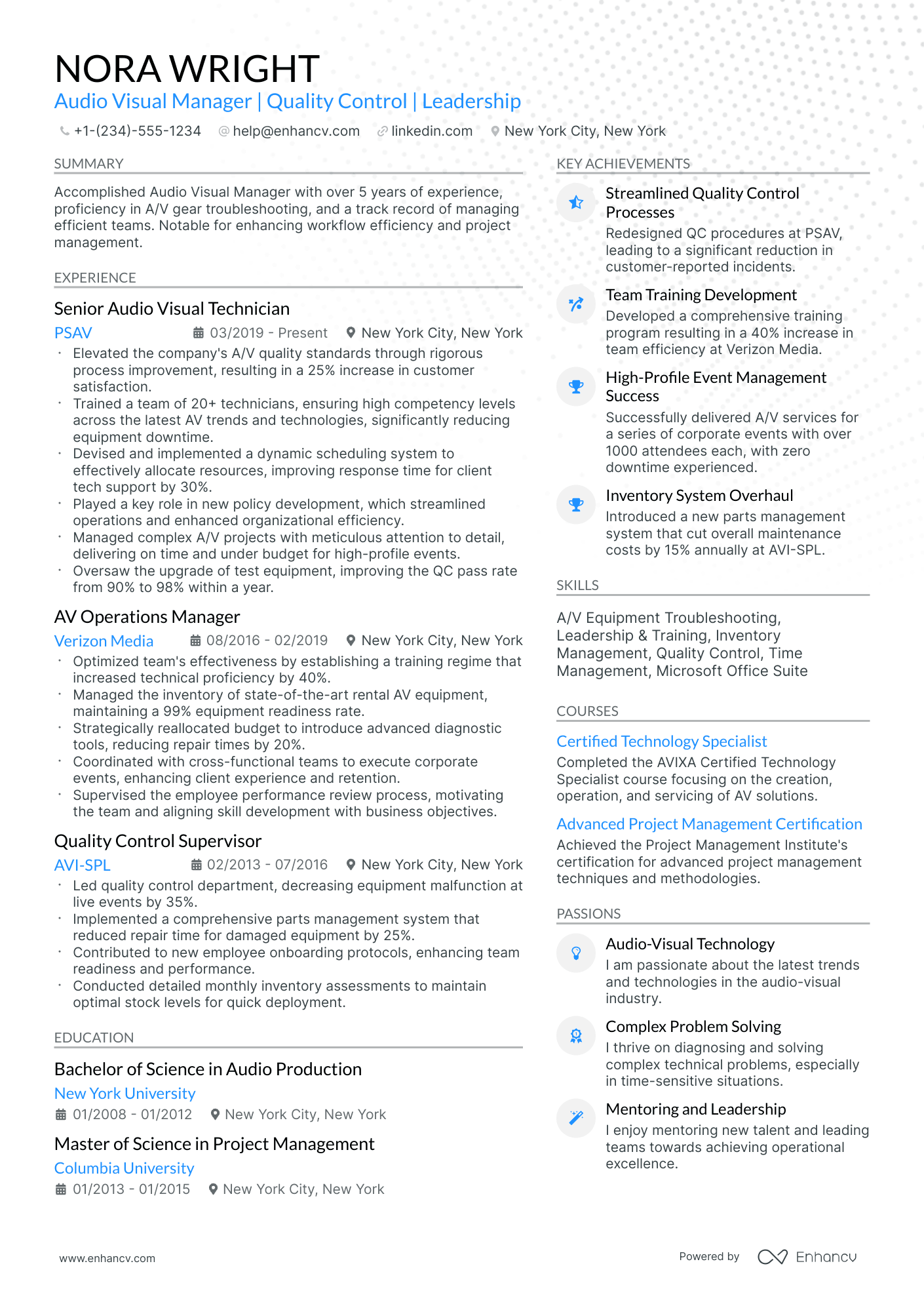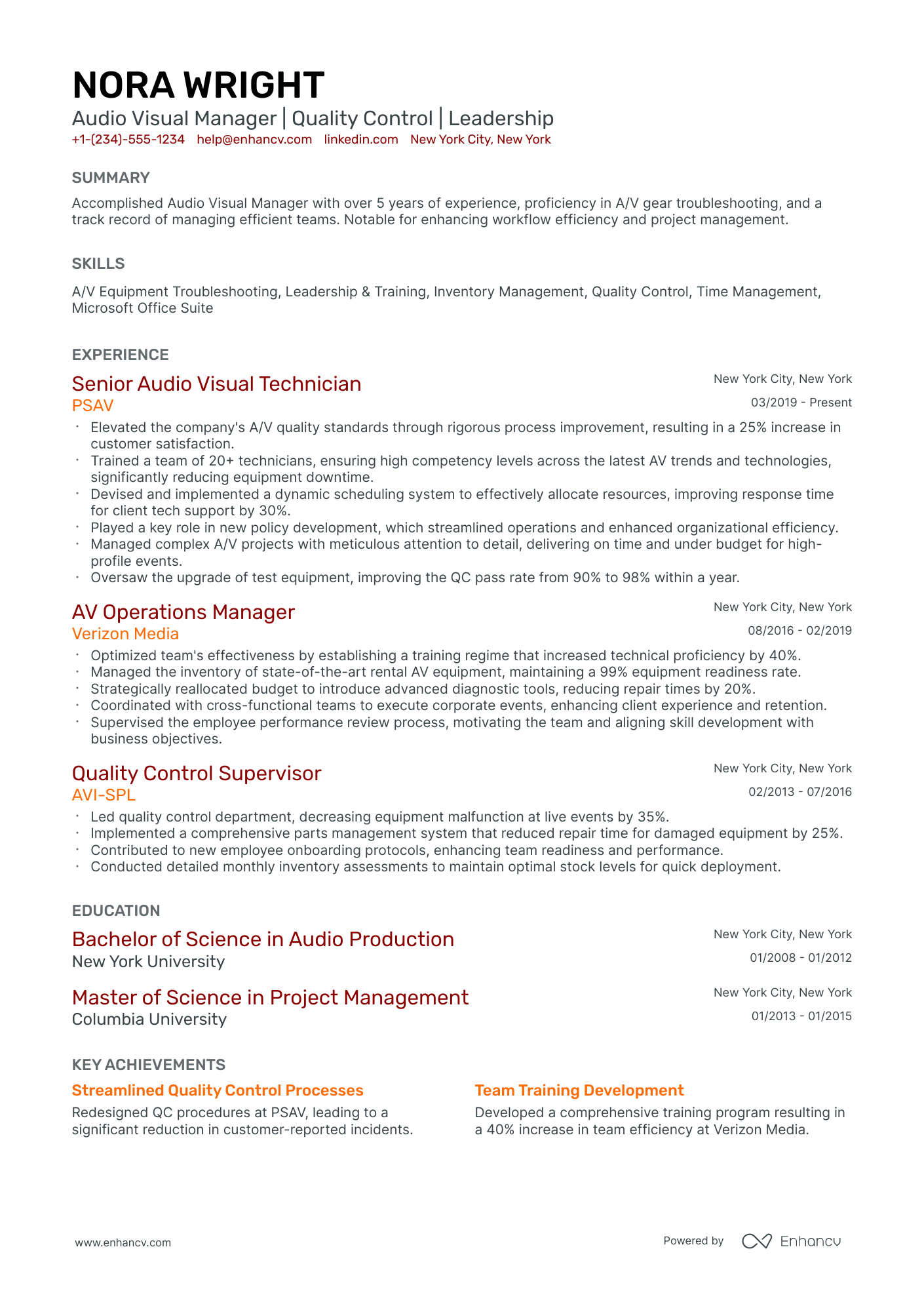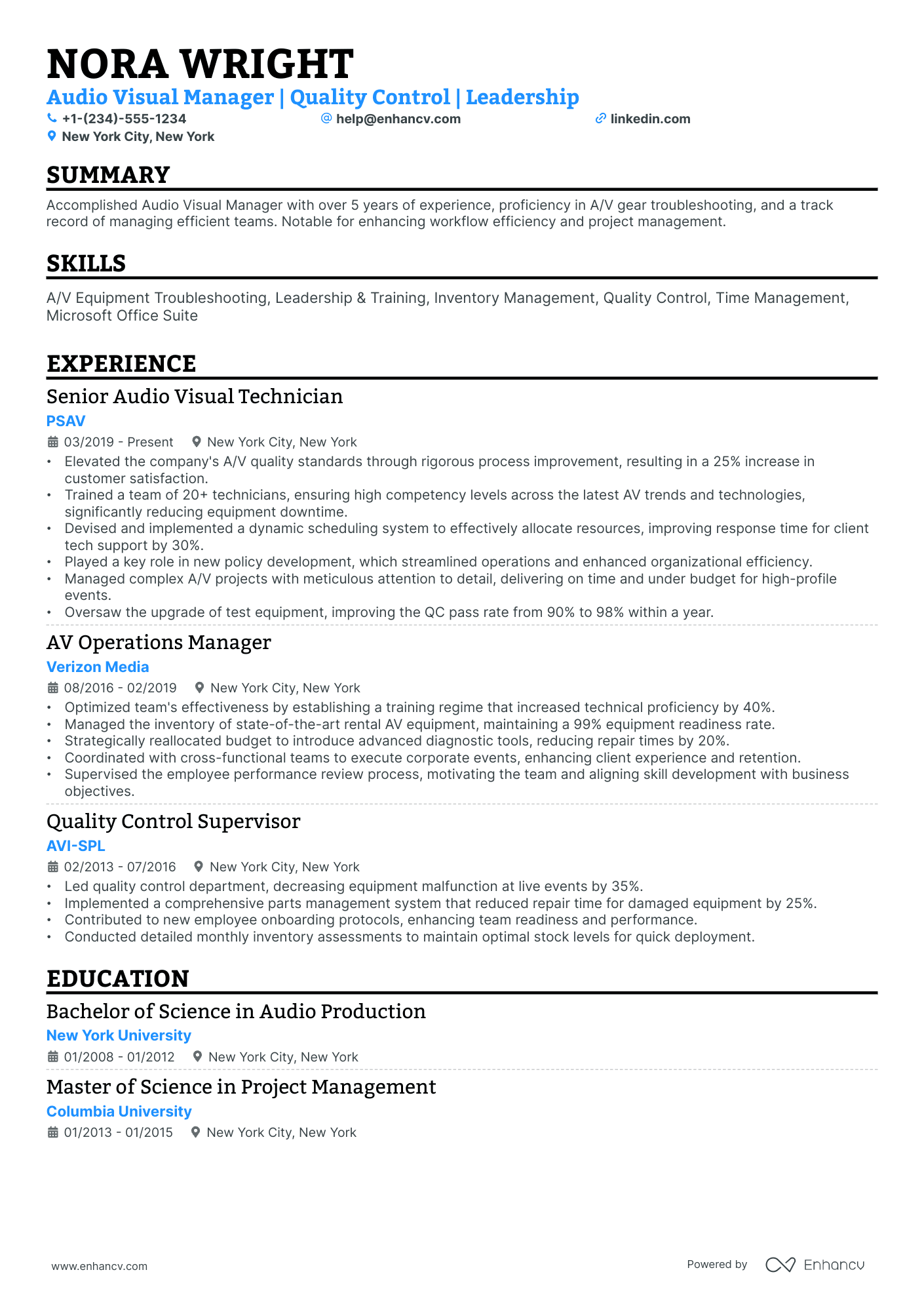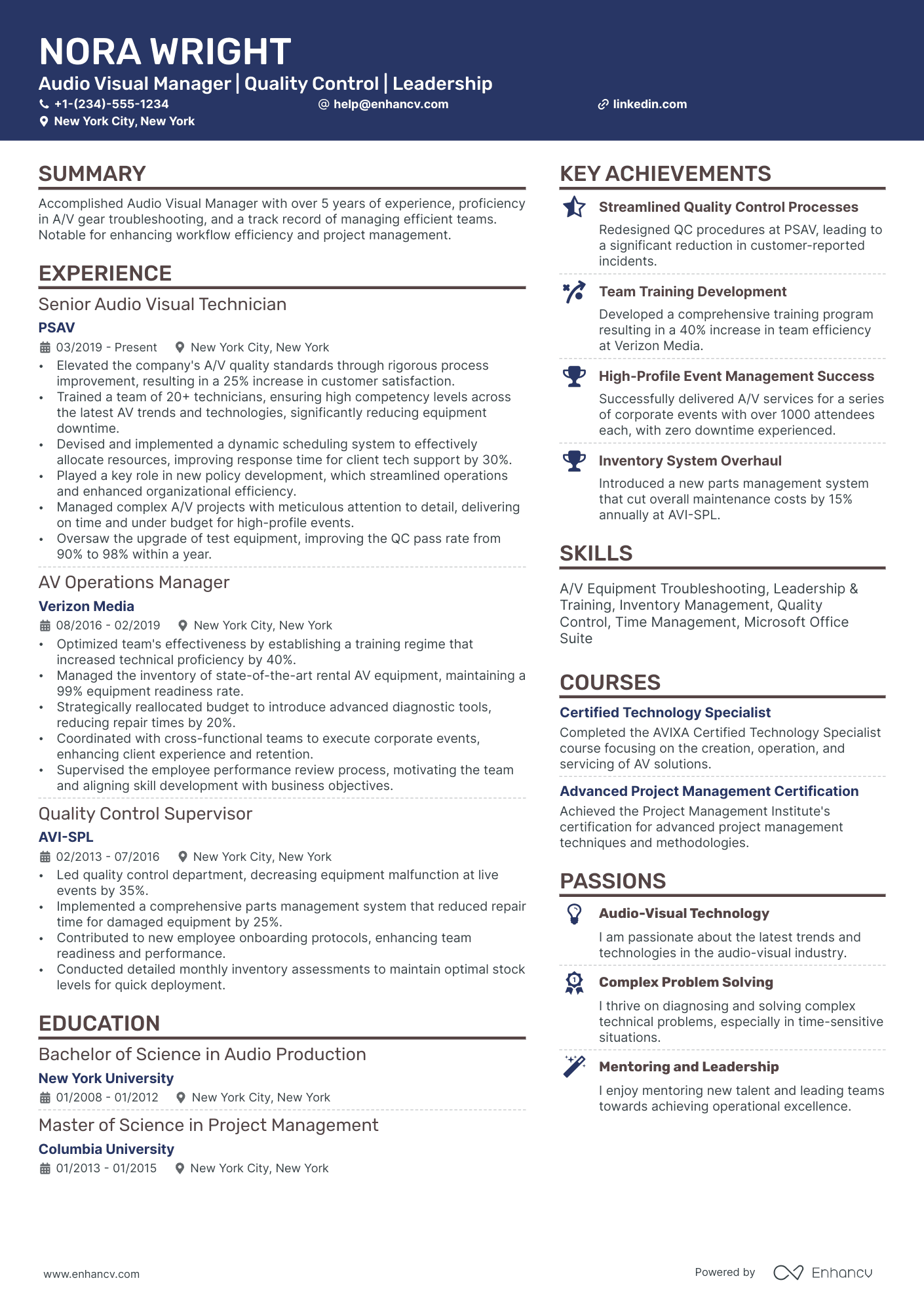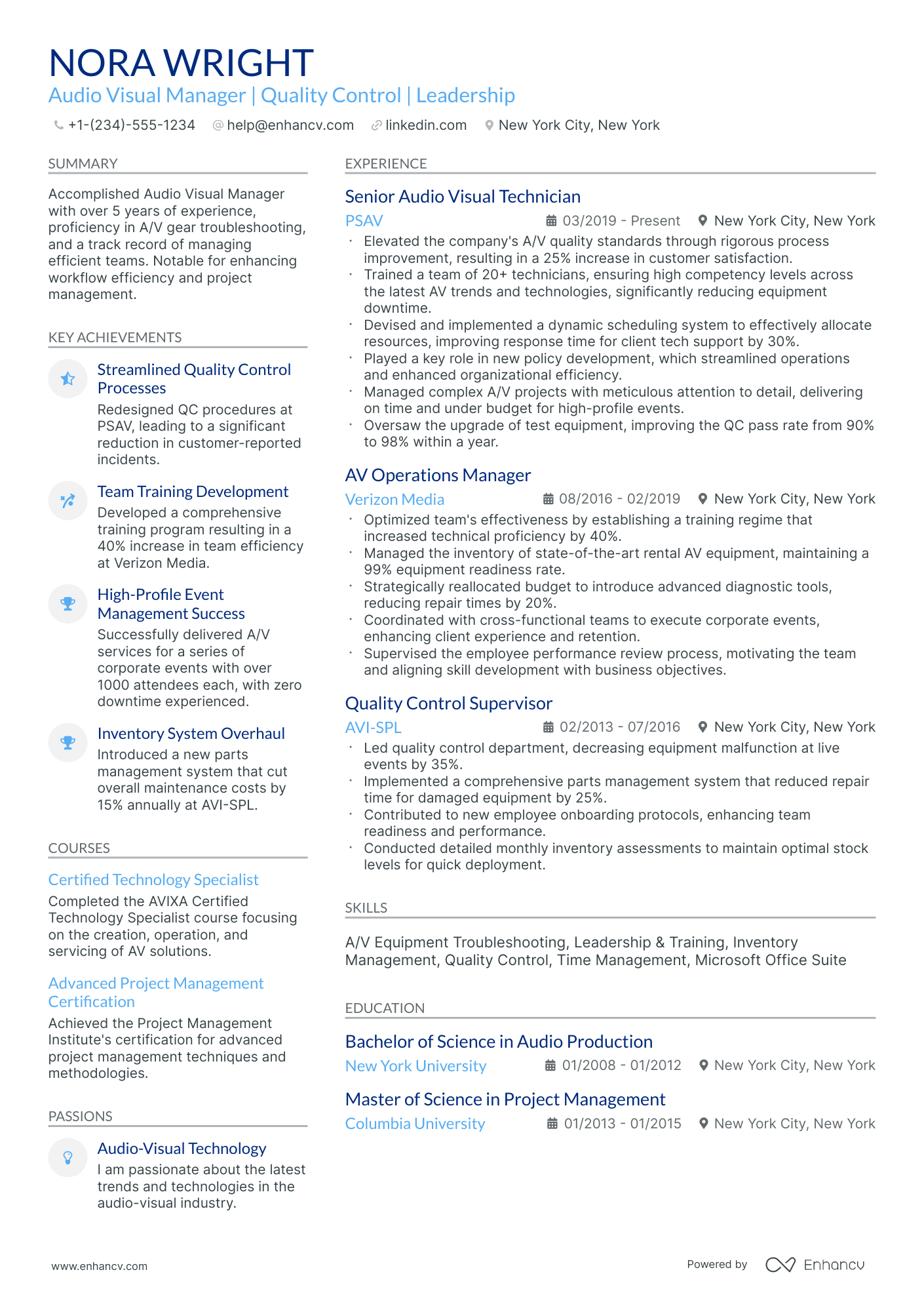As a quality control manager, you might find it challenging to succinctly showcase your extensive experience in process improvement and regulatory compliance on your resume. Our guide will provide you with targeted advice to effectively highlight your expertise and achievements, ensuring your resume stands out to potential employers.
- Which sections do you need to include in your resume to meet recruiters' requirements;
- How to write your quality control manager resume experience section - even if you have don't have little to no work experience;
- Real-life professional examples to guide you how to write the most important quality control manager resume sections;
- Adding even more sections so your quality control manager resume stands out with professionalism and your personality.
We've also selected some of the best (and most relevant) resume guides for the quality control manager role you're applying for:
- Quality Assurance Engineer Resume Example
- Quality Assurance Officer Resume Example
- Quality Consultant Resume Example
- Release Manager Resume Example
- Quality Technician Resume Example
- Quality Assurance Analyst Resume Example
- Quality Specialist Resume Example
- Quality Assurance Associate Resume Example
- Data Quality Analyst Resume Example
- Quality Manager Resume Example
The importance of format and layout in your quality control manager resume
Consider you're an HR professional at company X, evaluating two quality control manager candidate resumes. John Smith presents a simple, traditional, and easy-to-read resume. Edward Price, however, uses a non-conventional, often illegible format. Whose resume would you spend more time on to understand their experience? This scenario underscores the importance of your quality control manager resume’s design. It should be simply formatted and clearly communicate why you are the ideal candidate for the role.
Achieve this balance by:
- Listing your experience, beginning with the most recent and relevant, in reverse chronological order;
- Ensuring your header contains essential information, such as contact details, a headline, and a portfolio link. Include a professional photo in the quality control manager resume header if you have one;
- Including only the most important and relevant resume sections to showcase your expertise and stand out from other candidates;
- Editing your quality control manager resume to be no longer than two pages if you have extensive relevant experience. Use your limited resume space judiciously.
Also, remember that your quality control manager resume might initially be scanned by an Applicant Tracker System (ATS).
When it comes to ATS:
- Opt for simple and legible fonts like Raleway, Rubik, Lato, etc., making your experience easy for the ATS to scan;
- Use serif and sans-serif fonts, both of which are ATS-friendly;
- Avoid overused options like Arial and Times New Roman, which, while suitable, may lack personality.
Contrary to a common myth, our recent study shows that the ATS can effectively process both one-column and two-column resumes. Learn more about this in the ATS myths guide.
Finally, when submitting your quality control manager resume, always export it as a PDF to ensure all information remains intact, making the document easier to print, read, and scan.
Different markets have specific resume styles – a Canadian resume, for instance, may require a different approach.
Upload & Check Your Resume
Drop your resume here or choose a file. PDF & DOCX only. Max 2MB file size.
PRO TIP
If you failed to obtain one of the certificates, as listed in the requirements, but decide to include it on your resume, make sure to include a note somewhere that you have the "relevant training, but are planning to re-take the exams". Support this statement with the actual date you're planning to be re-examined. Always be honest on your resume.
Recruiters' preferred quality control manager resume sections:
- A header with relevant contact information and headline, listing your current job title
- A resume summary or objective pinpointing what is most impressive about your expertise (that aligns with the role)
- An experience section highlighting the specifics of your responsibilities and achievements
- A skills sidebar to intertwine job advert keywords with your unique talents
- An education and certifications sections to serve as further accreditation to your professional experience
What recruiters want to see on your resume:
- Proven experience in implementing and monitoring quality control systems and standards in a manufacturing or production environment.
- In-depth knowledge of relevant quality control tools and methodologies such as Six Sigma, lean manufacturing, or total quality management (TQM).
- Strong analytical skills with a detailed-oriented mindset, able to analyze data, understand trends, and make data-driven decisions to improve product quality.
- Experience with regulatory compliance and certifications, showing understanding of industry standards like ISO 9001, FDA, etc., relevant to the sector.
- Leadership experience demonstrating the ability to manage and develop a quality control team, including training employees on quality standards and processes.
Defining your professional expertise in your quality control manager resume work experience section
The work experience section, often the most detailed part of your resume, is where you discuss your past roles and achievements. To effectively list your experience, consider these four key tips:
- Align your expertise with the job requirements. It's vital to integrate keywords matching the job criteria to pass initial assessments;
- Show, don’t just tell. Quantify your responsibilities by stating your actual achievements in previous roles;
- Include measurable metrics. For instance, how did your performance impact the annual ROI?
- Highlight crucial industry skills. Mention both technological knowledge and interpersonal skills in this section.
These guidelines will help you craft an impressive quality control manager resume work experience section that is bound to catch recruiters' attention.
- Developed and executed strategic plans for quality control in alignment with company objectives, leading to a 20% increase in overall product quality year-over-year.
- Managed a team of 15 quality control analysts, providing continuous training and development that resulted in a 30% reduction in error rate.
- Pioneered the use of advanced statistical analysis tools for monitoring product quality, which significantly improved detection of defects and non-conformance issues.
- Orchestrated the revision and enhancement of standard operating procedures, which contributed to a 25% improvement in compliance with regulatory standards.
- Led the successful certification process for ISO 9001:2015, resulting in an improved market reputation and trust from clients.
- Spearheaded a successful cross-functional team initiative to standardize quality control processes across multiple manufacturing sites.
- Implemented a company-wide quality management system, cutting costs by 15% through the reduction of waste and non-value-added activities.
- Directed and improved the supplier quality management program, which led to higher quality raw materials and components with a 20% decrease in supplier defects.
- Initiated and supervised a product quality improvement project that enhanced customer satisfaction ratings by 35%.
- Introduced a real-time quality monitoring system that reduced production downtime by 40% due to quicker response to quality deviations.
- Managed and optimized product testing protocols, improving testing efficiency by 50%, while maintaining rigorous quality standards.
- Collaborated with R&D to incorporate quality by design principles in new product development, ensuring quality objectives were met prior to launch.
- Cultivated a culture of continuous improvement that led to a sustained reduction in customer complaints by an average of 20% annually.
- Implemented lean manufacturing techniques that resulted in a 15% faster quality check process without compromising the precision of inspections.
- Negotiated and established lasting relationships with external quality assurance consultants to enhance the in-house team's expertise.
- Led the quality control team through a significant regulatory audit, with zero major findings for the first time in company history.
- Drove the automation of quality control processes, reducing manual processing time by 60% and improving data integrity for regulatory reporting.
- Championed a collaborative approach with the product development teams to infuse quality perspectives early in the design phase, leading to a reduction in redesign cycles.
- Carried out comprehensive risk assessments that identified critical control points, decreasing the likelihood of quality incidents by 25%.
- Coordinated with international manufacturing partners to align quality standards, facilitating a smoother global supply chain operation.
- Advanced employee quality awareness programs that increased staff competency in quality control measures and standards.
- Expertly managed the quality control lifecycle of over 300 products, ensuring all items met or exceeded stringent quality benchmarks.
- Implemented a scalable quality management system to support a 50% increase in production output while maintaining defect rates below 0.5%.
- Conducted targeted training programs that led to a highly skilled quality control workforce capable of adapting to evolving industry standards.
Quantifying impact on your resume
- Quantify the number of quality control checks completed per month, demonstrating efficiency and thoroughness.
- Include the percentage decrease of defective products under your management to show your effectiveness in reducing errors.
- State the amount of cost savings achieved through quality control improvements to highlight your financial impact.
- List the number of quality assurance policies you've developed or revised, indicating your proactive approach to quality management.
- Mention any increase in customer satisfaction scores related to product quality to reflect customer-centric outcomes.
- Specify the number of team members you've managed or trained in quality control practices to show leadership and mentorship.
- Detail the number of audits conducted and the subsequent compliance rates to underscore your commitment to standards.
- Present the percentage improvement of process cycle times as a result of your quality control initiatives to demonstrate efficiency gains.
Action verbs for your quality control manager resume
What if my quality control manager experience doesn't match the requirements?
You've just graduated from college and may have no real world job experience . What should you include within your resume then?
Instead of making up information or adding irrelevant past jobs (e.g. your on-campus work during freshman year), you can:
- Shift the focus from your professional experience to your community impact with your volunteer work. This would showcase numerous soft skills you've built over time (e.g. interpersonal communication);
- Highlight the projects you've completed, as part of your coursework, or, on your own. Thus, you will align your technical background with recruiters' requirements;
- Consider spotlighting your transferrable skills. Or, what lessons and talents your current professional and personal experience has taught you and how they could benefit your potential employers;
- Even if you've had a few months of internship experience, that is relevant for the role, make sure to include this. Recruiters do care about the years of experience you happen to have, but, at the end of the day, your profile would also be assessed based on role alignment.
Recommended reads:
PRO TIP
If you failed to obtain one of the certificates, as listed in the requirements, but decide to include it on your resume, make sure to include a note somewhere that you have the "relevant training, but are planning to re-take the exams". Support this statement with the actual date you're planning to be re-examined. Always be honest on your resume.
In-demand hard skills and soft skills for your quality control manager resume
A vital element for any quality control manager resume is the presentation of your skill set.
Recruiters always take the time to assess your:
- Technological proficiency or hard skills - which software and technologies can you use and at what level?
- People/personal or soft skills - how apt are you at communicating your ideas across effectively? Are you resilient to change?
The ideal candidate presents the perfect balance of hard skills and soft skills all through the resume, but more particular within a dedicated skills section.
Building your quality control manager skills section, you should:
- List up to six skills that answer the requirements and are unique to your expertise.
- Include a soft skill (or two) that defines you as a person and professional - perhaps looking back on feedback you've received from previous managers, etc.
- Create up to two skills sections that are organized based on the types of skills you list (e.g. "technical skills", "soft skills", "quality control manager skills", etc.).
- If you happen to have technical certifications that are vital to the industry and really impressive, include their names within your skills section.
At times, it really is frustrating to think back on all the skills you possess and discover the best way to communicate them across.
We understand this challenge - that's why we've prepared two lists (of hard skills and soft skills) to help you build your next resume, quicker and more efficiently:
Top skills for your quality control manager resume:
Statistical Process Control (SPC)
Six Sigma
ISO 9001 Standards
Quality Management Systems (QMS)
Root Cause Analysis (RCA)
Failure Mode and Effects Analysis (FMEA)
Quality Auditing
Measurement and Inspection Tools
Data Analysis Software (e.g., Minitab, Excel)
Quality Improvement Methodologies
Leadership
Communication
Attention to Detail
Problem-Solving
Analytical Thinking
Team Collaboration
Time Management
Adaptability
Conflict Resolution
Decision Making
PRO TIP
If you're in the process of obtaining your certificate or degree, list the expected date you're supposed to graduate or be certified.
How to include your education and certifications on your resume
We're taking you back to your college days with this part of our guide, but including your relevant higher education is quite important for your resume.
Your degree shows recruiters your dedication to the industry, your recent and relevant know-how, and some form of experience in the field.
Your quality control manager resume education should:
- Include your applicable degrees, college (-s) you've graduated from, as well as start and end dates of your higher education;
- Skip your high school diploma. If you still haven't graduated with your degree, list that your higher education isongoing;
- Feature any postgraduate diplomas in your resume header or summary - this is the perfect space to spotlight your relevant MBA degree;
- Showcase any relevant coursework, if you happen to have less professional experience and think this would support your case in being the best candidate for the role.
As far as your job-specific certificates are concerned - choose up to several of the most recent ones that match the job profile, and include them in a dedicated section.
We've saved you some time by selecting the most prominent industry certificates below.
The top 5 certifications for your quality control manager resume:
- Certified Quality Manager/Organizational Excellence (CQM/OE) - American Society for Quality (ASQ)
- Certified Six Sigma Black Belt (CSSBB) - American Society for Quality (ASQ)
- Certified Quality Auditor (CQA) - American Society for Quality (ASQ)
- ISO 9001:2015 Certified Lead Auditor - Exemplar Global
- Lean Six Sigma Green Belt Certification (LSSGB) - International Association for Six Sigma Certification (IASSC)
PRO TIP
If you happen to have plenty of certificates, select the ones that are most applicable and sought-after across the industry. Organize them by relevance to the role you're applying for.
Recommended reads:
Your quality control manager resume top one third: choosing between a resume summary or an objective
The top third of your resume is crucial, as recruiters might focus only on this section rather than reading the entire document. Therefore, it's important to carefully decide whether to include a resume summary or an objective.
- The resume summary encapsulates your most significant experiences, key achievements, and skills in the field. Ideal for candidates with substantial relevant experience, the summary previews what recruiters will find in the rest of your resume.
- The resume objective outlines your professional aspirations. It describes your career goals for the coming years and how you envision your role evolving in the prospective company. The resume objective is suitable if you have less professional experience and wish to emphasize various soft skills such as motivation, vision, and planning.
Explore some of the best examples of resume summaries and objectives from real-life professional resumes in the industry.
Resume summaries for a quality control manager job
- With over 15 years of experience mastering the intricacies of quality control in the pharmaceutical sector, I have effectively implemented robust quality monitoring systems. Spearheaded an initiative that slashed defect rates by 30% within a year, my expertise in GMP regulations, risk assessment, and process optimization sets a high bar for excellence in product integrity and safety.
- As a software developer transitioning into quality control management, I bring acute analytical skills and a honed understanding of agile methodology. With 10 years under my belt coding and resolving complex system bugs, my career pivot is fueled by a drive to elevate product quality standards and bridge the gap between technical development and end-user satisfaction.
- Leading a team in the competitive aerospace sector, I leveraged my 12-year tenure to consistently surpass quality benchmarks and propel our company to achieve ISO 9001 certification. My ability to troubleshoot process bottlenecks and integrate cutting-edge inspection technologies led to a record-low 2% product return rate due to quality issues.
- A seasoned professional in automotive engineering, I am now channeling a decade's worth of project management and technical acumen into a quality control management role. My successes in launching innovative vehicle safety features and optimizing supply chain protocols underscore my commitment to uphold and amplify product excellence standards.
- Keen to transition into quality control management, my background in consumer electronics retail management has endowed me with a unique perspective on consumer expectations and product standards. With a relentless focus on customer satisfaction and a track record of managing a top-performing store, I'm set to apply my insights to enhance quality processes and outcomes.
- As a recent graduate with a degree in Biochemistry and a passion for pharmaceutical excellence, I am eager to embark on a career path in quality control management. Armed with internship experience and knowledge of FDA regulatory compliance, I am committed to contributing a fresh perspective and unwavering dedication to ensuring that products meet and exceed quality and safety standards.
Taking your quality control manager resume to the next level with these four additional resume sections
Your quality control manager resume can feature a variety of skills (both hard and soft) in diverse sections. Choose those that align best with the job requirements and reflect your suitability for the company culture.
Consider these four additional resume sections recommended by our experts:
- Languages - State any languages you are proficient in and your level of proficiency. This demonstrates your commitment to communication and potential for international growth.
- Projects - Highlight up to three significant projects you've completed outside of work, showcasing skill development. Include a link to your project portfolio in the quality control manager resume header, if applicable.
- My Time - How you allocate your time outside work can indicate your organizational skills and cultural fit within the company.
- Volunteering - Detail causes you're passionate about, roles you've held, and achievements in volunteering. Such experiences likely have honed a range of soft skills crucial for your dream job.
Key takeaways
At the end of our guide, we'd like to remind you to:
- Invest in a simple, modern resume design that is ATS friendly and keeps your experience organized and legible;
- Avoid just listing your responsibilities in your experience section, but rather focus on quantifiable achievements;
- Always select resume sections that are relevant to the role and can answer job requirements. Sometimes your volunteering experience could bring more value than irrelevant work experience;
- Balance your technical background with your personality traits across various sections of your resume to hint at how much time employers would have to invest in training you and if your profile would be a good cultural fit to the organization;
- Include your academic background (in the form of your relevant higher education degrees and certifications) to show recruiters that you have the technical basics of the industry covered.
